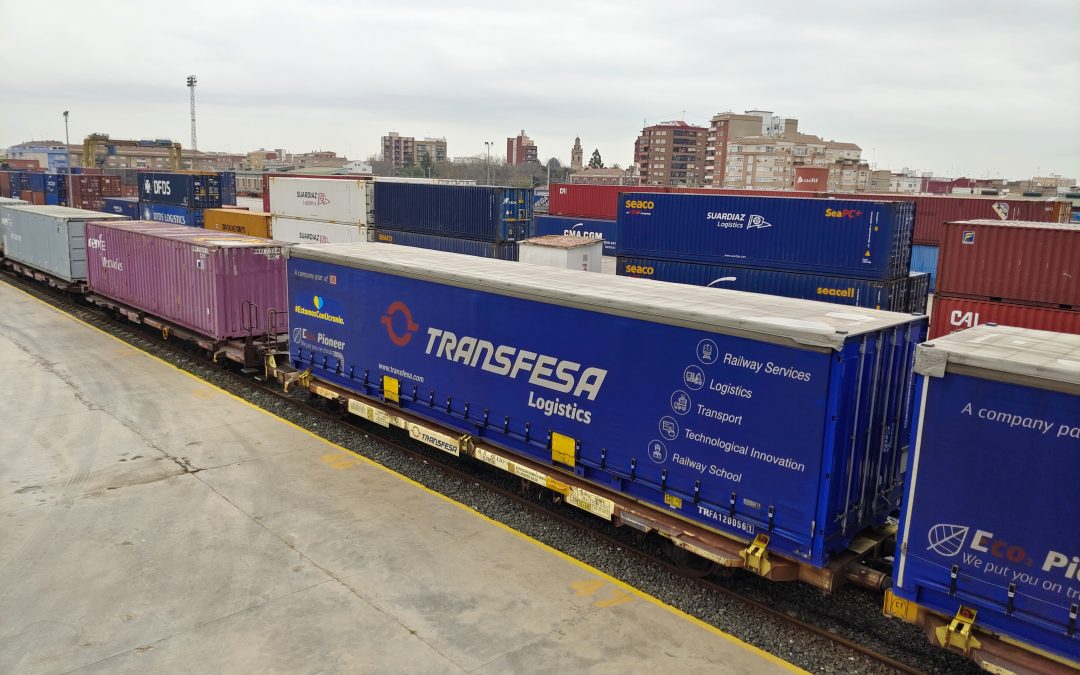The first 400,000 kilos of humanitarian aid to Ukraine have arrived at the Silla intermodal railway station by train.
- Companies and operators in the region, such as Grupo Alonso and MSC, have joined forces with Renfe and Transfesa Logistics to carry out the solidarity project.
- The initiative is open to the participation of other companies and institutions.
Valencia, 29 March 2022.- The solidarity train which, on this first occasion, is loaded with humanitarian material stored at the Zendal Hospital in Madrid, has made its first stop on the Mediterranean Corridor. After arriving at the intermodal railway station in Silla, Valencia, this Monday, it left for France with its 400,000 kilos of goods. The Alonso Group, manager of this Valencian terminal, has taken care of the container transhipment operation on a pro bono basis.
After crossing the Spanish free trade border, the goods will travel to Germany, where they will join the humanitarian corridor organised by DB Cargo Ag, which is entering various points in Ukraine.
This train, organised by Transfesa Logistics in collaboration with Renfe Mercancías, the Community of Madrid, MSC and Grupo Alonso, will transport 21 containers in a single trip with donations from different NGOs, city councils and institutions, channelled through the Community of Madrid, which has ceded the storage space of the Zendal Hospital – with 5,000 square metres -, becoming an aid centre in coordination with the Ukrainian Embassy.
The four companies involved in the initiative operate in Valencia, making this project possible. Renfe Mercancías, which provides traction in Spain, wagons and containers for this solidarity corridor, MSC, which provides 20 containers, and Grupo Alonso, which transships containers at its Silla Intermodal Terminal, have already joined this operation.
Transfesa Logistics, together with DB Cargo, organises the operation, providing traction in France, Germany, Poland and Ukraine, wagons, containers, trucks, warehouses and the operation of changing wagon axles, both at the Spanish-French border and at the Polish-Ukrainian border.
After this first stop, the convoy will continue its journey through Cerbère, in France, as well as Saarbrücken, Mannheim and Berlin, in Germany, to finally unload all the donations in Ukraine.
Idoia Galindo, member of the Transfesa Logistics Executive Committee and responsible for leading the launch of this initiative, emphasises that “it is a rail corridor that reaches several cities in Ukraine and that we have made available to all those companies, NGOs or institutions that may need to transport humanitarian aid. We believe it is important for them to know that this corridor exists and that they can use it, as right now the train is the only alternative for getting food, medicines and other basic necessities to many people in Ukraine. We also invite all companies and institutions to collaborate with this humanitarian corridor in order to keep it running for as long as possible.
Bernd Hullerum, CEO of Transfesa Logistics states that “we are proud to join this railway bridge that is making it possible to help the victims of the war in Ukraine. I would like to thank all the companies and colleagues who have made this solidarity train a reality”. And he adds that “we will continue to help through the railway which, once again, proves to be essential in emergency situations such as this.”
This new corridor is available to NGOs, institutions or companies that have large volumes of donations and will allow transporting all this wave of solidarity directly to Ukraine, as the railway is the only means of transport that is currently being able to enter many areas of the country. Moreover, this train will allow the equivalent of 21 trucks to be transported, which simplifies and accelerates the arrival of humanitarian aid to the Ukrainian population.
This corridor is available to all companies in institutions, including Valencian companies that want to upload solidarity goods destined for Ukraine by train.
The operation will be carried out as follows: donations are loaded into containers which are transported by lorry from where they are stored (in this first train, it is the Zendal Hospital) to the railway terminal in Madrid where they are loaded onto the train, the means by which they arrive in Ukraine. Loads can also be loaded onto future trains at the intermodal terminal in Silla. The train makes a stop in Germany, where it joins DB Cargo’s solidarity corridor, which is already in operation, carrying humanitarian aid from different European countries to various points in Ukraine.

